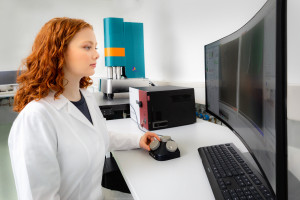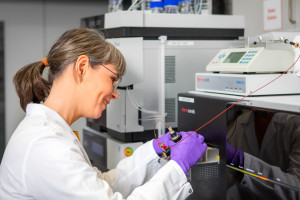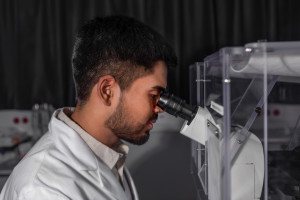-
ISAS develops analytical technologies and combines them into new high-performance measuring strategies for health research. The aim is to develop analytical methods for precision medicine tailored to individual patients in order to optimise the prevention, diagnostics and (personalised) therapy of cardiovascular diseases, autoimmune diseases and cancer, for example. The Institute's applied basic research focuses on translation into the clinic. For this reason, ISAS researchers cooperate at an early stage with partners from various university hospitals and the healthcare industry.
When and where do diseases occur in the body? What criteria determine why identical therapies have different success rates in different patients? In order to unravel the underlying physiological processes, analytical methods are required that are able to simultaneously obtain information about different classes of molecules such as proteins, lipids and metabolites - and that are able to map their spatial and temporal distribution.
-
The core of ISAS's research concept therefore lies in 4D analytics. In short, 4D analytics comprises a quantitative and qualitative analysis of biological systems as well as time- and spatially-resolved identification of (bio-)molecules. At ISAS, scientists develop combined methods in which complementary, coordinated analytical technologies - for example mass spectrometry and microscopy - are used as integrative measuring strategies. The information obtained with the help of 4D analytics is important for a deep understanding of the causes of diseases at the molecular level. They are also the basis for the development of new screening or therapeutic strategies, for example.
Goals
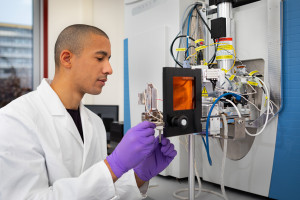
-
Research programmes
Research projects
Joint Project on Heart Failure: HI-FIVE
In a research project funded by the state government of North Rhine-Westphalia and the European Union, researchers are developing GRK5 inhibitor-based drugs for the treatment of heart failure. The enzyme GRK5 plays a key role in the deterioration of heart function. The new active substances are also designed to take gender- and age-specific aspects of the disease into account.
NUCLEAR: A Training Network at the Heart of Cancer Research
The European Union is funding the NUCLEAR PhD training network with the aim of training young scientists in the fields of metabolic regulation of genome function and cell identity in the context of stem cell biology and cancer research. Twelve partner organisations, including ISAS, are participating in NUCLEAR, pooling their expertise in stem cell biology, precision nutrition, mass spectrometry and drug development, among other areas.
B2B-RARE – Bench to Bedside: Therapies for Individuals with Hereditary Muscle Disorders
An interdisciplinary consortium of researchers in North Rhine-Westphalia is dedicated to improving the quality of life of patients with neuromuscular diseases by developing new precision diagnostic and treatment methods. Their goal is to find suitable therapies for patients and bring these directly to their bedsides.
New Research Training Group of Essen University Medical Centre & ISAS is Dedicated to Consequential Injury Following a Heart Attack
When blood starts flowing again after a heart attack, it can literally flood the affected heart muscle cells with oxygen and nutrients and thus cause secondary damage. The DFG-funded research training group ‘TCI repAMI’ at the University Hospital Essen and ISAS is investigating how immune cells, blood vessel cells and heart muscle cells interact in this process. Clinical and research experts are working together in tandem teams in eleven sub-projects to provide interdisciplinary training for a total of 33 doctoral students.
Imaging Tissue Metabolism with Enhanced Sensitivity of Dual Laser Mass Spectrometry
Researchers aim to develop post-ionisation methods using dual laser-based MSI instrumentation (MALDI-2) in the project »Imaging Tissue Metabolism with Enhanced Sensitivity of Dual Laser Mass Spectrometry«.
TRR 332 – Neutrophils: Origin, Fate & Function
At ISAS, scientists in the subproject »Phagocytic crosstalk between neutrophils and macrophages« investigate how immune cells of the type of phagocytes – in specific neutrophil granulocytes and macrophages – communicate with one another.
Fast Meat Control (FMC)
The objective of FMC is to develop a mobile measuring instrument which can be used to identify bacteria at meat-processing plants. The hand-held measuring instrument uses a method based on plasma gas chromatography-ion mobility spectrometry (Plasma-GC-IMS).
AI Assisted Imaging of Large Tissues
Researchers on the »Imaging of Large Tissues« project are developing a workflow to combine the various microscopy imaging methods and analytical, mass spectroscopy methods.
Optimising Anaemia Treatment for Patients with Chronic Kidney Disease (NephrESA)
In order to treat anaemia more effectively, researchers in the »NephrESA« project are developing a computer model which can be used to determine the risks and prognoses of the medication for each individual affected.
Research groups
-
AMBIOM
AMBIOM – Analysis of Microscopic BIOMedical Images aims to enable a high analytical throughput of microscopic images.
-
Biofluorescence
The Biofluorescence research group focuses on the response of immune cells to sterile inflammation. The aim of the scientists is to uncover the cellular and molecular mechanisms involved in sterile infections.
-
Bioimaging
The research group Bioimaging aims to detect the molecular and cellular processes that underly so-called immuno-vascular interactions under inflammatory conditions.
Persons
Hamza Abu Hani
Trainee
Department: Infrastructure
Team: IT Services

Norman Ahlmann
Technical Assistant Laser Safety Officer
Department: Bioanalytics
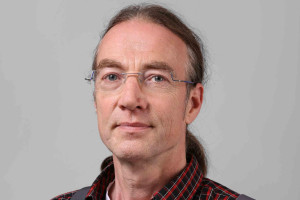
Dr. Anastasia Alexandridou
Research Associate
Department: Bioanalytics
Research group: Proteomics

Dr. Belal Alshaar
Research Associate
Department: Bioanalytics
Research group: Lipidomics

Dominika Bezdeková
Research Associate
Department: Bioanalytics
Research group: Lipidomics

Jonas Bodmann
Lab Technician
Department: Translational Research
Research group: Cardiovascular Pharmacology
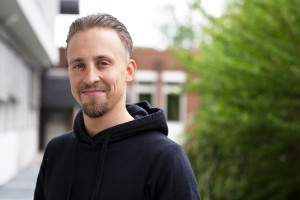
Tanja Both
Secretary
Department: Infrastructure
Team: Executive Office & Services

Dr. Eike Brockmann
Research Associate
Department: Bioanalytics
Research group: Lipidomics

Dr. Jianxu Chen
Research Group Leader
Department: Biospectroscopy
Research group: AMBIOM

